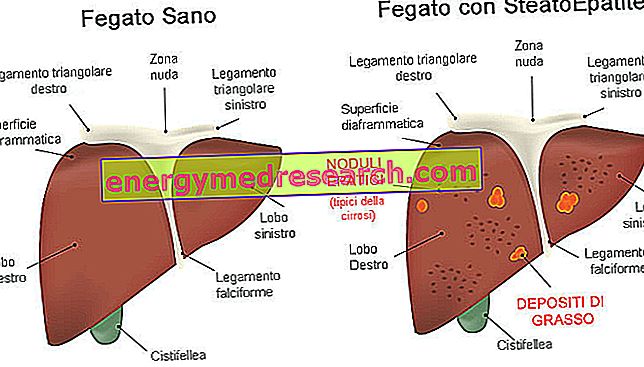What's this ?
Alcoholic hepatitis is an inflammatory disease affecting the liver caused by the abuse of alcohol over time. In most cases it is accompanied by an excessive accumulation of triglycerides in the liver (hepatic steatosis); for this reason we speak more correctly of alcoholic steatohepatitis.
It should be noted, however, that the appearance of alcoholic fatty liver tends to precede hepatitis by many years; moreover, while steatosis is a particularly frequent finding in alcoholics and heavy drinkers (60-100% of cases), alcoholic hepatitis develops in a more limited number of subjects (20-30% of cases).
Hepatic alcohol injuries therefore tend to follow a well-defined chronological manifestation: steatosis usually precedes alcoholic hepatitis and cirrhosis (10-20% of cases). Sometimes, to tell the truth, there is a direct passage from alcoholic steatosis to fibrosis, then to cirrhosis in the absence of a frank alcoholic hepatitis that acts as an intermediate stage.

Risk factors
In addition to alcoholism, the main risk factors are the nutritional status of the patient and his genetic and metabolic traits. In general, it is possible to observe a linear correlation between the extent and duration of alcohol abuse and the development of liver diseases; however, exceptions are not lacking, due precisely to the aforementioned metabolic and genetic variability of the population; as a result, not all alcohol abusers develop significant liver damage.
How many grams of alcohol do you take with a drink?
Therefore the statement that to develop an alcoholic hepatitis would require a consumption of 80 g of alcohol per day for at least a decade is entirely indicative, while the threshold to develop cirrhosis would be 160 g per day for 8-10 years.
Finally, the increased susceptibility of women to alcoholic liver disease is noteworthy, even when the doses of intake are adequately corrected (30% less depending on the lower metabolic capacity).
Symptoms
The clinical manifestations of alcoholic hepatitis can vary greatly depending on the intensity of the inflammation, which can occur in the acute or chronic form. In the first case there is abdominal pain, accompanied by fever, lack of appetite, neutrophilic leukocytosis and by the signs and symptoms of cirrhosis and its complications, ascites, jaundice, hepatic encephalopathies, gastroesophageal bleeding due to ruptured varicose veins, neutrophil leukocytosis and increase in prothrombin time. In the chronic form of alcoholic hepatitis the symptoms are more nuanced: weakness and general malaise, nausea, vomiting, weight loss, fever and liver tenderness (pain in the epigastrium and right hypochondrium). Plasma increases in biochemical markers of hepatic distress are also more limited.
Complications
Beyond the not negligible risk (10-15%) of losing life following an acute episode of hepatitis, the most known and feared complication of this disease is liver cirrhosis.
The prolonged intake of alcohol stuffs liver cells with fat, to the point of bursting it and thus putting a strain on the extraordinary regenerative capacities of this organ. Thus, if subjected to alcoholic insults repeated over time, the liver cells do not regenerate anymore, limiting themselves to healing (liver fibrosis); the onset of these scar lesions is favored by the inflammatory process that characterizes alcoholic hepatitis. Over time, fibrosis progresses and worsens, involving increasingly important areas of the organ to heavily subvert its architecture and functionality: in this case we speak of alcoholic cirrhosis. Considering the prominent role of the liver in body metabolism, cirrhosis causes quite serious imbalances, so that at an advanced stage the only solution to save the patient's life is liver transplantation. Furthermore, cirrhosis is accompanied by an important risk of evolution in hepatocellular carcinoma.
Healing times and treatments
See also: Drugs for the treatment of alcoholic hepatitis
Unlike what was seen for alcoholic hepatic steatosis, which normally resolves in 10-14 days from the beginning of abstention from alcohol, alcoholic hepatitis requires many weeks or months to heal. In addition to the total abstention from the consumption of alcoholic beverages - a goal also pursued through specific drugs for the treatment of alcoholism - it is important to adopt a light and balanced diet, possibly supported by vitamin supplements according to medical indications. The use of corticosteroids may be necessary to resolve the inflammatory process associated with more severe forms of alcoholic hepatitis. Prognosis and hypotheses of reversibility of liver damage are variable and depend on the severity of the inflammatory process.



